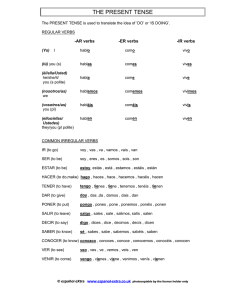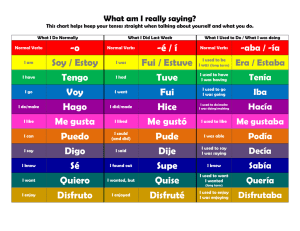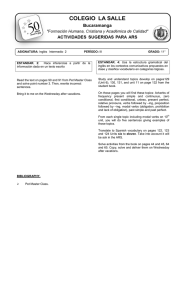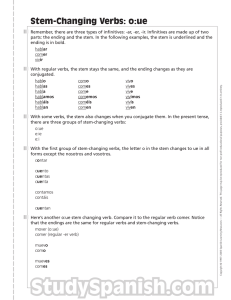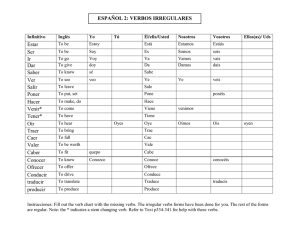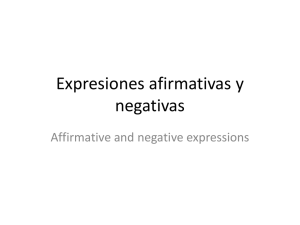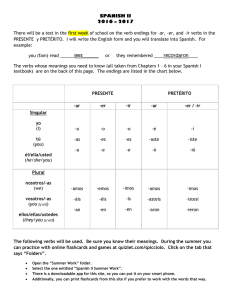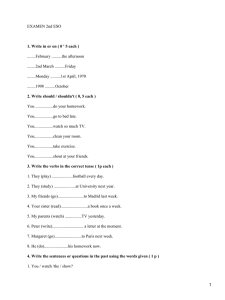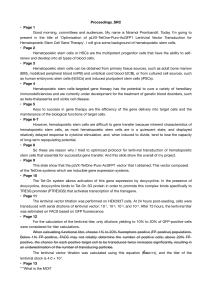Stem changing verbs + the affirmative and negative
Anuncio
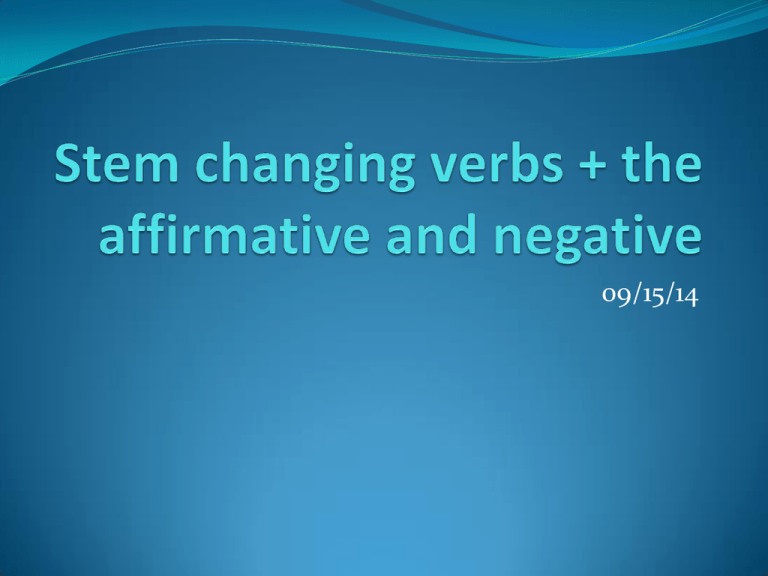
09/15/14 Learning Goals: I will review my knowledge of stem changing verbs and their conjugation I will revisit how to make statements affirmative and negative in Spanish So let’s start with… Do you know what kinds of stem changing verbs there are? In Spanish there are “stem changing verbs”… These are verbs that change their stem when conjugated in all forms EXCEPT for nosotros and vosotros In the present tense, there are three types of stem changing verbs: o:ue e:ie e:i Stem changing verbs: o:ue An example of a verb that changes from o:ue is costar Here is how costar is conjugated: Yo cuesto Tú cuestas Él/Ella/Usted cuesta Nosotros costamos Vosotros costáis Ellos/Ellas/Ustedes cuestan Stem changing verbs o:ue Here are more examples of stem changing verbs: Almozar (to eat lunch) Probar (to prove) Morir (to die) Dormir (to sleep_ Aprobar (to approve) Recordar (to recall) Mostrar (to show) Devolver (to return) Colgar (to hang) Resolver (to solve) Mover (to move) Volver (to return from) Contar (to count) Rogar (to beg) Stem changing verbs e:ie An example of a verb that changes from e:ie is cerrar: Yo cierro Tu cierras Él/Ella/Usted cierra Nosotros cerramos Vosotros cerráis Ellos/Ellas/Ustedes cierran Stem changing verbs e:ie Here are more examples of stem changing verbs: Entender (to understand) Perder (to lose) Mentir (to lie) Negar (to deny) Fregar (to scrub) Empezar (to begin) Comenzar (to begin) Preferir (to prefer) Confesar (to confess) Pensar (to think) Consentir (to consent) Defender (to defend) Convertir (to convert) Advertir (to advise) Stem changing verbs e:i An example of a verb that changes from e:i is repetir: Yo repito Tú repitas Él/Ella/Usted repita Nosotros repetimos Vosotros repetís Ellos/Ellas/Ustedes repiten Stem changing verbs e:i Here are more examples of stem changing verbs: Colegir (to deduce) Perseguir (to pursue) Impedir (to impede) Decir (to say) Competir (to compete) Reír (to laugh) Medir (to measure) Elegir (to elect) Conseguir (to get) Sonreír (to smile) Pedir (to ask for) Gemir (to groan) Corregir (to correct) Servir (to serve) Now we’ll move onto… 10-4 Roger that… When some people think of the word “affirmative”, they think of the military or radio codes, but really all “affirmative” means is just to agree with a statement And “negative” doesn’t imply that you’re being a Debbie Downer, it just means that it does not agree with a statement Negative and Affirmative You already know that to make a sentence negative, you can just add “no” before the verb in a sentence like this: No sé. No entiendo. No tengo dinero. …however, there are more ways that the affirmative and negative can be communicated in Spanish Negative and Affirmative Using the following words, you can change the meaning of your statement to be affirmative or negative: Algo (something) Alguien (someone) Algún/o/a/s (something) Siempre (always) También (also) O…o (either, or) Nada (nothing) Nadie (no one) Ningún/o/a/s (nothing) Nunca (never) Tampoco (neither) Ni…ni (neither…nor) Negation In English, a double negative is not used grammatically and typically leads to the statement becoming affirmative In Spanish, not only can you make a statement a double negative, but if you really want to drive home a point, you can make it a triple negative Por ejemplo… Nadie habla. No habla nadie. Nobody speaks. Nobody speaks. Nunca habla nadie. Nobody ever speaks. However… Unlike in English, you cannot mix affirmative and negative phrases in Spanish. English: Maria doesn’t need anything. Spanish: María no necesita nada. Algún y ningún Alguno and ninguno typically drop the –o when they are in front of a masculine singular noun ¿Tienes algún libro? No, no tengo ningún libro. Alguno/a and ninguno/a are generally used in the singular ¿Tienes alguna revistas? No, no tengo ninguna. Algún y ningún The plural alguno/a and ninguno/a is only used when the noun it modifies only exists in the plural: Ningunas vacaciones a Florida son completas sin una excursión a el mundo de Disney. No vacation to Florida is complete without a trip to Disney World. Now it’s time for fun and games!
